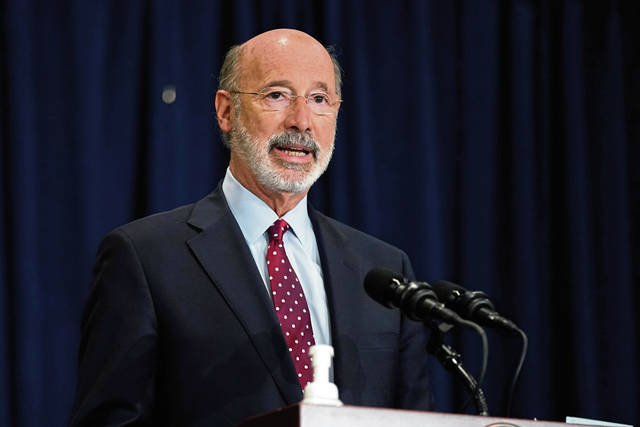https://development.triblive.com/news/pennsylvania/wolf-defends-funding-plan-for-public-education/
Gov. Wolf defends funding plan for public education

Gov. Tom Wolf doubled down on his proposal for major funding increases for public education, joining others on Thursday to lay out additional details for improving equity across Pennsylvania.
“Pennsylvania’s school funding system is unfair to students, teachers and communities,” Wolf said during a virtual press briefing.
Wolf on Wednesday gave his annual budget address to the General Assembly, including a proposed $1.3 billion investment in public schools. His proposal involves shifting school funding away from its reliance on local property taxes and instead pulling from adjusted income tax levels.
On Thursday, Wolf said the investment is a “common sense plan” to restore fairness in school funding. He proposed using the “fair funding formula” created in 2016 by a bipartisan commission to determine more basic education funding. Though enacted five years ago, the formula has been used for only 11% of state school funding – the rest has been determined using enrollment figures from 1992, nearly 30 years ago, Wolf said. Districts often have to make up the difference using property tax increases. When they can’t, they resort to cuts.
Without widespread use of the formula, Wolf charged that growing school districts in both rural and urban settings aren’t funded enough to meet the needs of their students.
“The fair funding formula only works if it’s fully enacted,” Wolf said. “So we still have work to do.”
The formula will determine how to distribute $6.2 billion (compared to $700 million last year), as well as a $200 million increase this year. In total, Wolf’s plan directs $6.4 billion in state funding to schools through the formula, and an additional $1.15 billion will be dedicated to ensuring “no school loses a single dollar in state resources from using the formula.”
The increased funding relies on an increased income tax of 4.49% – but only for Pennsylvania’s wealthiest 33%, Wolf said. He said 27% of residents would see no changes in income taxes, and 40% would see a decrease.
“What I want to do here is try to do what we need to do to improve funding for basic things like education, and do it in a fair way, in a way that doesn’t disadvantage families that are just starting out,” Wolf said.
Wolf’s plan also calls for setting the starting teacher salary in the state to be at least $45,000 a year – more than doubling the current minimum salary of $18,500. Pennsylvania has long struggled with a shrinking population of teachers and substitutes, a labor issue only exacerbated by the covid-19 pandemic and quarantine requirements.
The plan includes charter school reform that he said would save school districts more than $229 million a year and increase transparency. The reforms entail a statewide cyber school tuition rate and aligning taxpayer spending to the charter’s actual school costs. He said he wants to invest in higher education through the Nellie Bly tuition program, which he introduced last year.
Republicans were quick to criticize Wolf’s plan, calling it “dead on arrival” and saying the income tax increase would harm local business owners and middle class families. State Republicans said the plan defies Pennsylvania’s constitutional requirement for uniform taxes. Wolf countered that there is an exemption to that requirement when lawmakers must address poverty.
Meanwhile, some public education advocates and experts said the plan could be a turning point for improving educational equity in the state. Funding inequity has been an ever-present issue in the state and region, where economic segregation and dwindling population disproportionately affect certain districts more, due to shrinking property tax revenues.
During the covid-19 pandemic, the problem has been even more apparent, as districts struggled to raise money for internet and technology needed for continued education.
At Thursday’s press briefing, State Rep. Chris Rabb, D-Philadelphia County, said Wolf’s proposal offered a “bold vision” that is in the best interests of both sides of the aisle. He noted the commonwealth’s constitution guarantees a thorough and efficient system of public education.
“Despite our constitutional mandate in our commonwealth, we still live in educational apartheid in Pennsylvania, where the disparities are significant,” Rabb said. “So significant that the single most influential factor to determine if a public school student gets the most money is whiteness.”
Rabb said the bill would benefit rural and urban districts alike that are unable to grow without raising property taxes, due to the state’s outdated funding formula. A third of Pennsylvania’s 500 or so districts are inequitably funded, he said, but it represents more than half the commonwealth’s students.
Copyright ©2026— Trib Total Media, LLC (TribLIVE.com)
